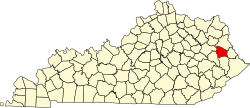Johnson County, Kentucky | |
|---|---|
 Johnson County Judicial Center in Paintsville | |
 Location within the U.S. state of Kentucky | |
| Coordinates: 37°50′N82°50′W / 37.84°N 82.83°W | |
| Country | |
| State | |
| Founded | February 24, 1843 |
| Named after | Richard Mentor Johnson |
| Seat | Paintsville |
| Largest city | Paintsville |
| Area | |
• Total | 264 sq mi (680 km2) |
| • Land | 262 sq mi (680 km2) |
| • Water | 2.2 sq mi (5.7 km2) 0.8% |
| Population (2020) | |
• Total | 22,680 |
• Estimate (2024) | 22,098 |
| • Density | 86.6/sq mi (33.4/km2) |
| Time zone | UTC−5 (Eastern) |
| • Summer (DST) | UTC−4 (EDT) |
| Congressional district | 5th |
| Website | www |
Johnson County is a county located in the U.S. state of Kentucky. As of the 2020 census, the population was 22,680. [1] Its county seat is Paintsville. [2] The county was formed in 1843 and named for Richard Mentor Johnson, a colonel of the War of 1812, United States Representative, Senator, and Vice President of the United States. [3]
Contents
- History
- Formation
- Civil War era
- John C. C. Mayo
- Geography
- Adjacent counties
- Transportation
- Major highways
- Air
- Demographics
- 2020 census
- 2000 census
- Politics
- Local government
- Elected officials
- Education
- Public
- Private
- Colleges
- Attractions
- Kentucky Apple Festival
- Parks and recreation
- Museums
- Historical sites
- Points of interest
- Miscellaneous
- Communities
- City
- Census-designated places
- Unincorporated communities
- Notable residents
- See also
- References
- External links
Johnson County is classified as a moist county, which is a county in which alcohol sales are not allowed (a dry county), but containing a "wet" city, in this case Paintsville, where alcoholic beverage sales are allowed.










